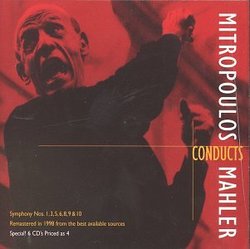| All Artists: Mahler, Mitropoulos Title: Symphonies 1 3 5 6 8 & 9 Members Wishing: 1 Total Copies: 0 Label: Music & Arts Program Release Date: 7/21/1998 Genre: Classical Styles: Historical Periods, Modern, 20th, & 21st Century, Symphonies Number of Discs: 6 SwapaCD Credits: 6 UPC: 017685102127 |
Search - Mahler, Mitropoulos :: Symphonies 1 3 5 6 8 & 9
 | Mahler, Mitropoulos Symphonies 1 3 5 6 8 & 9 Genre: Classical
|
Larger Image |
CD Details |
CD ReviewsAn Incredible Mahler 6th!!! D. J. Zabriskie | Park Ridge, NJ USA | 10/24/2003 (5 out of 5 stars) "I will not attempt to give an overview of this collection, but simply review the Mahler 6th here that a friend played for me
a couple of days ago. As is frequently the case with Mitropoulos, you have not really HEARD this piece until you've heard it the way Mitropoulos conducts it! As mentioned in the other review, Mitropoulos was conducting these scores from scratch, without reference to anyone else's approach and what he finds in the score to Mahler's Tragic Symphony and extracts from the orchestra is quite unlike what any other conductor has done. That does not necessarily make this performance superior to all others, anymore than it makes it more eccentric than all others, but having heard it just once, I can tell you that no serious Mahler collection is complete without it! As always, Mitropoulos presents a wealth of detail that other conductors either neglect or perceive to be part of something else. The opening march is taken rather slower than we're used to hearing it, but that only makes it more ominous. Of particular interest it the way Mitropoulos accentuates the piping of the flutes and the squacking of the other woodwinds. Rather than the prophecy of Nazi jackboots we so frequently hear in this movement, Mitropoulos gives us the kicking, screaming resistance of old Europe being dragged inevitably forward into a more mechanized, less compassionate world. Likewise, in the adagio, Mitropoulos' approach to Mahler's offstage horns evokes an image NOT of pastoral herdsmen, but the spirits of a way of life that is already lost forever. Mitropoulos' uncanny achievement here is to convey both the foreboding of a Europe at the crossroads and the anti-nostaglia of an older man returning home, only to find no one he recognizes and nothing to take solace in. That he can convey both these emotional truths with equal commitment SIMULTANEOUSLY is remarkable indeed. Like Mahler, Mitropoulos was a deeply SPIRITUAL man, without being strictly religious, and like Mahler, he viewed material and technological progress without corresponding spiritual progress as being false and dangerous. That is the emotional truth Mitropoulos finds at the core of Mahler's Tragic Symphony and conveys so eloquently." |

 Track Listings (5) - Disc #1
Track Listings (5) - Disc #1